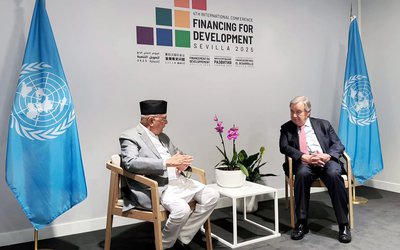
KATHMANDU, 10 September 2020 –On World Suicide Prevention Day, UNICEF calls on government and development partners, civil society, communities and families, to contribute to the prevention, therapy, treatment, and rehabilitation services for children and young people and ensure that mental health becomes part of mainstream health care services in Nepal.
For many families in Nepal, coping with COVID-19 goes beyond keeping a social distance, wearing masks and washing hands to avoid infection. It means confronting the growing uncertainties and livelihood worries that the pandemic brings which has many struggling to maintain hope in the future.
Given the previous high suicide rates in the country, the pandemic has further exacerbated the situation.Since mid-March 2020, 1,350 persons, including 319 children and 876 women died by suicide, overwhelmed by the emotional and mental toll of months of uncertainty and sometimes combined with experiences of trauma and loss.
Suicide among adolescent girls have increased by almost 40 per cent during the four months of lockdown compared to the same duration the previous year, with some increase among boys, according to the Nepal Police. To note, these figures only reflect those who died from suicide and were recorded with the police. Theydo not include non-recorded cases, suicide attempts nor people who are thinking of committing suicide. Every suicide leaves a trail of grief among those close to them.
According to the July 2020 findings of UNICEF’s Child & Family Tracker household survey, 49 per cent of families report an increase in stress levels since the lockdown, mainly related to concerns about their capacity to support their children. While suicide is increasing among youth, they represent a minority of callers seeking help. It is essential to expand support services for youth as well as address the social stigma associated with mental issues.
The restrictions that have accompanied the COVID-19 outbreak have had the most profound impact on children and young people whose lives have been disrupted in so many different ways including their education, recreational activities and weakening social connections with friends, peers, teachers and families. For others, it entails the increased risk of violence and exploitation including in families and communities. For everyone, it has meant significant changes in daily life, relationships and access to resources and services.
“Many signs of mental illness begin to manifest themselves before the age of 14 and suicide is currently one of the leading causes of death among Nepali youth”, said Elke Wisch, UNICEF Nepal Representative.
“As we confront COVID-19, we must take special care to protect the lives of children and provide families with the health care and social and economic support they need to face this complex situation. We must collectively work to increase social awareness and the understanding of psychological distress and strengthen integrated mental and psychosocial health services. Many children and their families carry the heavy burden of poor mental health and this will also incur considerable cost to the country, especially if we fail to act to support them”,added Ms. Wisch.
Since March, UNICEF has been supporting phone and online counselling services as well as supporting the deployment of community-based psychosocial workers. This has been undertaken in close partnership with civil society organizations in order to provide psychological first aid to men, women and children confronting the consequences of increased isolation, social tensions and economic hardships. UNICEF has also extended its support to the Kanti Children’s Hospital mental health programs to ensure age-appropriate mental health services are available for children and teenagers.
- India’s External Affairs Ministry’s Senior Officials Says Indo-Nepal relations are ever expanding
- Jul 05, 2025
- Bhutan Government Unveils Three Pronged Strategies To Tackle Skilled Migration Crisis
- Jul 05, 2025
- Weather Forecast: Generally Cloudy Across The Country With Heavy Rain At One Or Two Places Bagmati And Koshi Provinces
- Jul 05, 2025
- FNCCI President Dhakal Urges British Companies to Invest in Nepal
- Jul 04, 2025
- Nepal Is Expected To See 60,000 People Infected with Dengue This Year
- Jul 04, 2025















